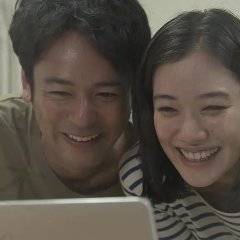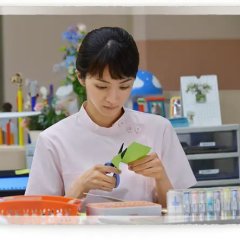 Starter Kit: Japan
Starter Kit: Japan - Français
- English
- magyar / magyar nyelv
- dansk
- Titre original: 若者たち
- Aussi connu sous le nom de: Young People: Wakamonotachi , Wakamono Tachi 2014 , The Youngsters , All About My Siblings ,
- Scénariste: Muto Shogo
- Réalisateur: Aizawa Hideyuki, Namiki Michiko, Sugita Shigemichi
- Genres: Romance, Vie quotidienne, Famille
Distribution et équipes
- Tsumabuki Satoshi Rôle principal
- Nagayama Eita Rôle principal
- Mitsushima Hikari Rôle principal
- Emoto Tasuku Rôle principal
- Nomura Shuhei Rôle principal
- Aoi YuSawabe AzusaRôle Secondaire
Critiques

Regrettably (how it pains me to begin with that word!) soaring expectations might cost this drama points with viewers. While Wakamono Tachi manages to score a place in the storied collection of worthy Japanese “life dramas,” it cannot be called perfect or even particularly groundbreaking. We follow the trials and tribulations of the orphaned Sato siblings, as well as those of their romantic prospects. Most story arcs focus on one sibling/issue at a time, detailing how the family pulls together so as to overcome it (or not). As might be expected from such a system, certain parts watch stronger than others. Characters Asahi, Satoru, and Hikari are front and center for the better episodes, most of which are warm and emotional. However, as focus spreads to the youngest siblings (and onward to the “girlfriends” and “boyfriend”) it becomes harder to swallow parts of the writing. Certain plots begin to touch upon the melodramatic and the tone/time frame for others ceases to reflect reality, though otherwise most events are thoughtfully placed. As strongly felt as the finale was, I could not but want for better closure. Several more episodes might have alleviated these issues, and I doubt viewers would object to extra time with the Sato family.
My favorite aspect of Wakamono Tachi must be its vibrant and quirky humor. The siblings primarily communicate in high-speed bickering around the dinner table, which often yields audacious and unbelievable dialogue. Many members of the Sato family are also wrestling fans, and so the most difficult emotional conundrums are solved over hearty talks—and outdoor brawls! What results is an unexpectedly lovable and relatable family that, despite any oddity, ends up working its way deep into the viewer’s heart. No matter the issues with the script, one begins to feel as though they will miss them when the series ends. I also believe the financial state our heroes are portrayed in (almost destitute!) helps them remain understandable. It is refreshing to meet with an every-man and his family for once, rather than a privileged member of the upper crust.
Without a doubt, Wakamono Tachi cast well. Tsumabuki Satoshi wins viewer sympathy as the sincere, hardworking Sato Asahi, whose more cliché characteristics are eclipsed masterfully by a strange mix of immaturity and fatherly instinct. A figure inherently good, Tsumabuki-san infuses Asahi with fetching laughter, contagious tears, and a performance most memorable. I'm not afraid to admit I fell in love. The widely lauded Eita settles into another complicated role as Sato Satoru, who explodes onto the scene as a menacing figure—but might his true self be loyal and loving? Mitsushima Hikari is safely one of the best actresses of her generation, and so in Sato Hikari maintains her standard. Hers might be the most precariously balanced story in the series, caught as it is between two moral poles; however, Mitsushima-san dons the role without the barest suggestion of difficulty. As for the other parts of the cast, most performances were passable to good with an almost universal connection of chemistry (particularly within the Sato family). If there were any weak links, I’d point either to Nomura Shuhei (Sato Tadashi) or Yoshioka Hidetaka (Shinjo Masaomi) but only when compared to the “big three.”
For those who concern themselves with music, this series employs a decent enough score with a good sense for incidental pieces and silence. Perhaps the only song worth writing home about would be the beautiful theme. It is provided by sweet-voiced Moriyama Naotaro, “Wakamono Tachi (Young People)” after the title of the drama. This gentle and nostalgic vocal suits the overall feeling of the series with surprising strength, even as it accompanies the credits. These show the characters, interspersed between the candid photographs of other (perhaps real?) examples of the modern Japanese youth.
Cet avis était-il utile?

I was certainly looking forward to the reunion of Mitsushima and Eita and seeing Tsumabuki in a drama again after so long sure is a delight. Whether the drama met my expectations or not cannot be answered with a simple Yes or No.
My main reason of watching was for the cast, so in that case I can't say I was disappointed. The characters felt real for me, the relationships authentic, and the chemistry is present. I was invested enough with the family that watching them every episode was bliss. Acting from the main characters was top notch. Asahi's character got many criticism of being over-acted, but I found it was actually well thought out. I think if he were played any other way it would've been too dramatic so I cannot imagine anyone playing it better than Tsumabuki. Other performances varied from great to okay but none felt miscast. Yoshioka Hidetaka didn't really add much to the characters so my shallow self wished it would've been a better looking actor that took the role XD He wasn't miscast but not too great either.
The story overall is heartwarming and sweet, but we had some story lines that were stronger than others, some more relatable than others, hence some episodes stronger than others. The story line revolving around the three older siblings were the most engaging. The story of the 2 youngest siblings was set-aside in the background and needed more attention from the writer. For that reason I found their resolve a bit shallow. Episodes about characters other than the siblings were less interesting. There were also a lot of cheesy dialogs running throughout the drama. It certainly isn't something new to Japanese dramas but dramas without cheesy dialogs have been done and this could've benefitted without as well
The soundtrack was used effectively here and the theme song added this timeless enchantment to the drama.
On the whole, not a perfect drama, but still touching and uplifting, with great performances and memorable roles. I will miss this drama for sure.
Cet avis était-il utile?

























































